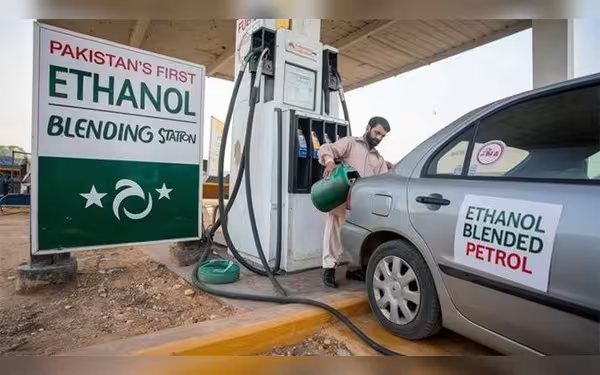Saturday, November 16, 2024 07:25 PM
Ethanol Blending: A Solution to Pakistan's Oil Import Crisis
- Ethanol blending can reduce oil imports significantly.
- Collaboration is essential for successful ethanol production.
- Government incentives are crucial for expanding ethanol initiatives.
 Image Credits: nation_pk
Image Credits: nation_pkEthanol blending in Pakistan could reduce oil imports, create jobs, and promote a cleaner environment through government support and collaboration.
Pakistan is facing a significant challenge with its oil imports, which are draining the national treasury. The country relies heavily on imported oil to keep its industries running, leading to a financial burden that many believe can be alleviated through the increased production of ethanol. Ethanol, a type of biofuel that can be mixed with traditional fossil fuels, presents a promising solution to this pressing issue.
Experts suggest that by focusing on ethanol blending, Pakistan can reduce its reliance on imported oil. Dr. Ahmed from the University of Agriculture, Faisalabad, emphasizes that this approach not only has the potential to save money but also to create jobs and promote a cleaner environment. He states, "Pakistan can easily handle the hefty cost of imported oil by focusing on ethanol blending. This will not only help the government create jobs but also contribute to a cleaner environment."
To make this vision a reality, policymakers need to establish a supportive framework that includes incentives to lower production costs and improve access to suitable feedstocks. According to the Pakistan Economic Survey, the transport sector is the largest consumer of petroleum products, consuming around 13.6 million metric tonnes in the Fiscal Year 2023-24 alone. This includes 5.28 million metric tonnes of gasoline and 2.37 million metric tonnes of diesel oil.
Dr. Ahmed points out that Pakistan has abundant resources for ethanol production, particularly from sugarcane and rice straw. He advocates for the adoption of modern technologies, such as enzymatic hydrolysis, which can enhance ethanol yield and reduce costs. He believes that blending ethanol with fossil fuels can significantly lower greenhouse gas emissions and foster domestic value chains.
Learning from the experiences of countries like Brazil and the United States could be beneficial for Pakistan as it develops its ethanol programs. Dr. Ahmed stresses the importance of collaboration among the government, industry, and research institutions to achieve the desired blending targets. He warns, "Without collaboration, we cannot address the emerging challenges and leverage opportunities."
Asif Ali, a sugarcane dealer, shares his insights on the sugar industry's potential for ethanol production. He notes that while the industry has great promise, the current blending mandate does not meet the necessary requirements. He explains, "Our production costs are high due to outdated machinery and limited access to feedstocks. Apart from sugarcane, we must expand our feedstock options and include rice straw and corn to increase ethanol production." He believes that ethanol blending could enhance profitability for millers and reduce the country's dependence on imported oil, but stresses the need for government incentives and tax breaks.
Waqar Ahmad, a progressive farmer, highlights the struggles faced by farmers due to high energy costs. He states, "We need to think outside the box and promote renewable energy sources like ethanol. Our farmers are ready to join hands with the government to cut reliance on imported oil, but they need friendly policies and incentives to solidify their financial standing."
The potential for ethanol blending in Pakistan is vast and could lead to significant economic and environmental benefits. By investing in this renewable energy source, the country can not only reduce its oil imports but also create jobs and foster a cleaner environment. It is crucial for the government to take proactive steps in supporting this initiative, ensuring that all stakeholders are aligned and working towards a common goal. The future of Pakistan's energy landscape could very well depend on the successful integration of ethanol into its fuel supply.













